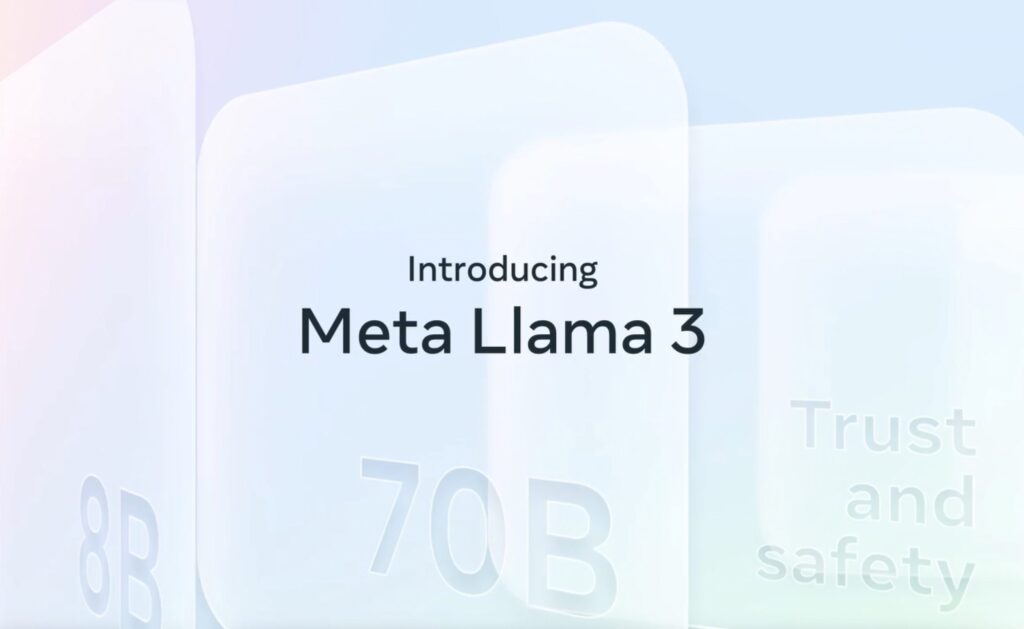Meta has announced the next generation of its state-of-the-art open source large-scale language model (LLM): Llama 3. The tech giant claims that Llama 3 establishes new performance benchmarks, outperforming previous industry-leading models such as GPT-3.5 in real-world scenarios.
“With Llama 3, we aimed to build the best open model that stands on par with the best proprietary models available today,” Meta said in a blog post announcing the release.
The first Llama 3 models released are the 8 billion and 70 billion parameter versions, and Meta says the team is training an even larger 400 billion+ parameter model that they plan to release in the coming months, along with a research paper detailing their work.
Llama 3 has been in development for over two years, with significant resources dedicated to innovative approaches to collecting high-quality training data, scaling distributed training, optimizing model architecture, and fine-tuning instructions.
Meta's 70 billion parameter instruction fine-tuned models outperformed GPT-3.5, Claude, and other LLMs of comparable scale in human evaluations across 12 key usage scenarios, including coding, inference, and creative writing. The company's 8 billion parameter pre-trained models also set new benchmarks on common LLM evaluation tasks.

“We believe these are the best open source models in their class,” Meta said.
The tech giant is releasing the model with an “open by default” approach to further promote an open ecosystem around AI development: Llama 3 will be available across all major cloud providers, model hosts, hardware manufacturers, and AI platforms.
“The launch of Meta's Llama 3 model is noteworthy amid a global movement towards AI regulation. By ensuring transparency through open sourcing, Meta aligns with the growing focus on responsible AI practices and ethical development,” said Victor Botev, CTO and co-founder of Iris.ai.
“Furthermore, the open model fosters development insight and the ability to vet different approaches, allowing for opportunities for broader community education as this transparency feeds back into regulatory drafting and enforcement.”
Meta's latest model comes with an updated suite of AI safety tools, including the second edition of Llama Guard to classify risk and CyberSec Eval to evaluate potential exploits. It also introduces a new component called Code Shield, which filters unsafe code suggestions during inference.
“But it's important to maintain perspective: simply being open source for a model does not automatically align with ethical AI,” Botev continues. “Addressing the challenges of AI requires a comprehensive approach that addresses issues such as data privacy, algorithmic bias, and societal impacts – all of which are key focuses of AI regulation emerging around the world.”
“Open initiatives like Llama 3 encourage scrutiny and collaboration, but their true impact depends on a holistic approach to AI governance compliance and embedding ethics into the lifecycle of AI systems. Meta's continued commitment to the Llama model is a step in the right direction, but ethical AI requires sustained commitment from all stakeholders.”
Meta says it has taken a “system-level approach” to responsible AI development and deployment with Llama 3. Models have undergone extensive safety testing, but the company stresses that developers will need to implement their own input and output filtering to suit their application requirements.
The company's end-user product with Llama 3 integration is Meta AI, and Meta claims to be the world's leading AI assistant thanks to the new model. Users can access Meta AI via Facebook, Instagram, WhatsApp, Messenger and the web for productivity, learning, creativity and general queries.
A multimodal version of Meta AI that integrates vision capabilities is coming soon, with an early preview coming to Meta's Ray-Ban smart glasses.
Despite Llama 3's impressive accomplishments, some in the AI field have expressed skepticism about Meta's motivation for an open approach “for the good of society.”
But just one day after Mistral AI set a new benchmark for open source models with the Mixtral 8x22B, the release of Meta has once again raised the bar for openly available LLMs.
reference: With its prepackaged AI models, SAS aims to make AI accessible regardless of skill set.

Want to learn more about AI and big data from industry leaders? Check out the AI & Big Data Expo in Amsterdam, California and London, a comprehensive event taking place alongside other major events like BlockX, Digital Transformation Week and Cyber Security & Cloud Expo.
Find out about upcoming enterprise technology events and webinars hosted by TechForge here.


